
Elliott Erwitt Trocadero, Paris 1950

People tend to forget that there are no functioning asset markets left. But there really aren’t.
• The Tesla Ponzi Is Not ‘Inexplicable’ At All (WS)
Electric cars have been around for longer than internal combustion engines. When they first appeared in the 1800s, they competed with steam-powered cars and horses. What Tesla has done is put them on the map. That was a huge feat. Now every global automaker has electric cars. They all, including Teslas, still have the same problem they had in the 1800s: the battery. But those problems – costs, weight or range, and time it takes to charge – are getting smaller as the technology advances. And the competition from the giants, once batteries are ready for prime-time, will be huge, and global. So in March, Tesla sold 4,050 new vehicles in the US, according to Autodata. All automakers combined sold 1.56 million new vehicles in the US.
This gave Tesla a record high market share of an invisibly small 0.26%. Volume-wise, it’s in the same ballpark as Porsche. GM sold 256,007 new vehicles in March, for a market share of 16.5%. In other words, GM sold 63 times as many new vehicles as Tesla did. For percent-lovers, that’s 6,221% more. Even if Tesla quadruples its sales in the US, it still will not amount to a significant market share. Then there is Tesla’s financial performance. It lost money in every one of its 10 years of existence. Here are the “profits” – um, net losses – Tesla racked up, in total $2.9 billion:
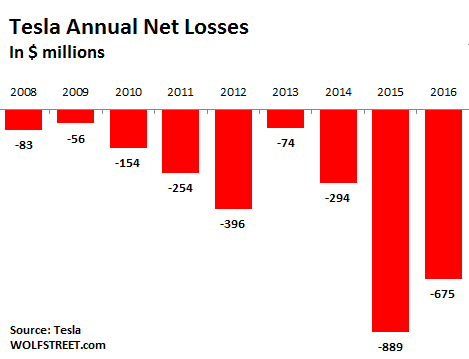
We constantly hear the old saw that stock prices reflect future earnings and/or cash flows, and that looking back ten years has no meaning for the future. Alas, after 10 years of producing losses, Tesla shows no signs of making money in the future. It might instead continue burning through investor cash by the billions. Based on the logic that stock prices reflect future earnings, its shares should be at about zero. This chart compares Tesla’s net losses (red bars) and GM’s net income (green bars), in millions of dollars. Over those eight years going back to 2010, Tesla lost $2.7 billion; GM earned $47.1 billion:
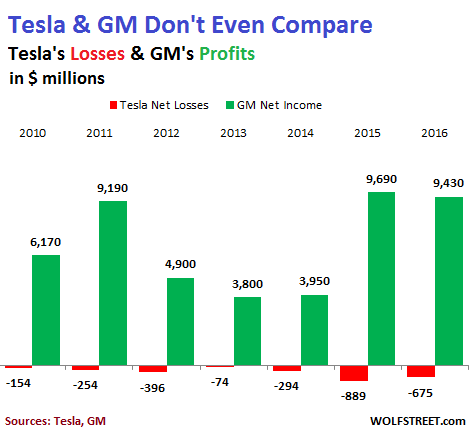
[..] In comparison with GM, Tesla is ludicrously overvalued. But it’s not “inexplicable.” It’s perfectly explicable by the wondrously Fed-engineered stock market that has long ago abandoned any pretext of valuing companies on a rational basis. And it’s explicable by the hype – the “research” – issued by Wall Street investment banks that hope to get fat fees from Tesla’s next offerings of shares or convertible debt. The amounts are huge, going back ten years: Last month, Tesla raised another $1.2 billion, after having raised $1.5 billion in May 2016. There will be more. Tesla is burning a lot of cash. Investment banks get rich on these deals. The bonuses are huge. So it’s OK to hype Tesla’s stock and sell it to their clients. Everybody wins in this scenario – except for a few despised short sellers who’re hung up on their silly notion of reality.

They simply can’t afford it.
• Millennials Are Abandoning Postwar Engines of Growth: Suburbs and Autos (CHS)
If anything defined the postwar economy between 1946 and 1999, it was the exodus of the middle class from cities to suburbs and the glorification of what Jim Kunstler calls Happy Motoring: freeways, cars and trucks, ten lanes of private vehicles, the vast majority of which are transporting one person. The build-out of suburbia drove growth for decades: millions of new suburban homes, miles of new freeways, sprawling shopping malls, and tens of millions of new autos, trucks, and SUVs, transforming one-car households into three vehicle households. Then there was all the furnishings for those expansive new homes, and the credit necessary to fund the homes, vehicles, furnishings, etc. Now the Millennial generation is turning its back on both of these bedrock engines of growth.
As various metrics reveal, the Millennials are fine with taking Uber to work, buying their shoes from Zappos (return them if they don’t fit, no problem), and making whatever tradeoffs are necessary to live in urban cores. Simply put, the natural progression of this generation is away from suburban malls, suburban home ownership and the car-centric commuter lifestyle that goes with suburban homeownership. Saddled with insanely high student debt loads imposed by the rapaciously predatory higher education cartel, Millennials avoid additional debt like the plague. Millennials have relatively high savings rates. As for a lifetime of penury to service debt–hey, they already have that, thanks to their “I borrowed $100,000 and all I got was this worthless college degree” student loans.
Consider the secondary effects of these trend changes. If Millennials are earning less and already carrying heavy debt loads, who is going to buy the Baby Boom’s millions of pricey suburban McMansions? The answer might be “no one.” If vehicle sales decline, all the secondary auto-related sales decline, too. Auto insurance, for example. Furnishing a small expensive urban flat requires a lot less furnishings than a 3,000 square foot suburban house. What happens to sales of big dining sets and backyard furniture? As retail malls die, property taxes, sales taxes and payroll taxes decline, too. Many cheerlead the notion of repurposed commercial space, but uses such as community college classes pay a lot less per square foot than retail did, and generate little in the way of sales and payroll taxes. Financial losses will also mount. Valuations and property taxes will decline, and commercial real estate loans based on nose-bleed valuations and high retail lease rates will go south, triggering significant financial-sector losses.

I’d think it couldn’t be easier.
• Slowdown in US Borrowing Defies Easy Explanation (WSJ)
One of the great mysteries and biggest concerns in the economy right now is the slowing growth in bank lending. Economists are searching for answers but none are entirely satisfying. Total loans and leases extended by commercial banks in the U.S. this year were up just 3.8% from a year earlier as of March 29, according to the latest Federal Reserve data. That compares with 6.4% growth in all of last year, and a 7.6% pace as of late October. The slowdown is more surprising given the rise in business and consumer confidence since the election. And it is worrisome because the lack of business investment is considered an important reason why economic growth has remained weak. Loans to businesses have slowed most sharply, with the latest data showing commercial and industrial loans up just 2.8% from a year earlier, compared with 8.9% growth in late October.
Economists at Goldman Sachs estimate the slowdown in commercial and industrial lending alone equates to a $100 billion shortfall in loans. Investors may start to get more clarity on what is causing the slowdown when banks start reporting first-quarter earnings on Thursday. One explanation is that many companies have been tapping corporate bond markets to lock in low rates, and in some cases to pay down more expensive bank debt. In the first quarter of this year, corporate bond issuance rose by 18% from a year earlier, according to the Securities Industry and Financial Markets Association. But one reason for the increase is that the first quarter of 2016 was dismal because of market turmoil. The rise isn’t enough to explain the entire shortfall in lending.
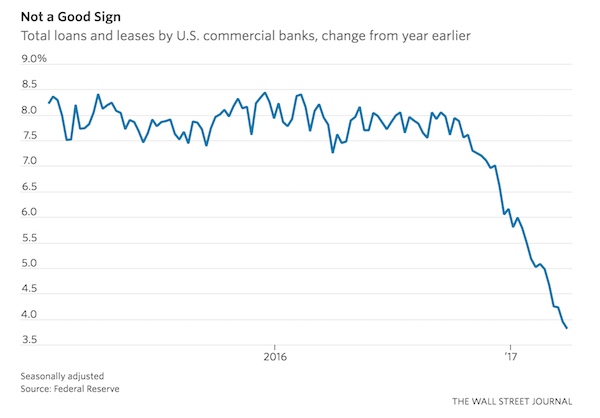

The Trump tax plan is way off schedule.
• US Companies Now Have $1.6 Trillion Stashed In Tax Havens (Ind.)
The 50 biggest US companies stashed another $200bn of profits in offshore tax havens in 2015 alone, taking the total to approximately $1.6 trillion, according to new analysis. Donald Trump’s plans to slash taxes for corporations and wealthy individuals and impose a border tax will harm average consumers further, Oxfam said in a report published on Tuesday. The 50 largest companies disclosed use of 1,751 subsidiaries in countries classed as tax havens by the OECD and the US National Bureau of Economic Research, an increase of 143 on a year earlier, the charity found. The true number may be far higher as only “significant” subsidiaries have to be disclosed. Big multinationals such as Google, Amazon and Apple have come under fire for routing sales through countries such as Bermuda, Ireland and Luxembourg, which offer them low tax rates.
While this is legal, critics say it does not reflect where the firms actually do business. The top rate of US corporate tax is 35% – one of the highest rates in the world, incentivising many companies to hold billions offshore. Mr Trump has pledged to reduce this to 15% and a one-off rate of 10% for money currently held abroad. That will hand a $328bn tax break to the 50 biggest companies, with Apple, Pfizer and Microsoft the biggest gainers, accounting for 40% of the total, Oxfam estimated. While some have welcomed the move as a sensible way to bring profits of US companies back to the country, Oxfam warns that it risks accelerating a race to the bottom that will harm consumers in America as well as the world’s poor as global tax rates plummet.

Scott Adams forecast three phases for opinion of Trump. First people would call him Hitler, then incompetent, then ‘competent but I don’t like it’. Is he on track?
• Trump Declines To Endorse Bannon, Says US ‘Not Going Into Syria’ (MW)
President Donald Trump declined to give top adviser Steve Bannon a vote of confidence during a New York Post interview published Tuesday, in which he also said the U.S. was not headed toward a ground war in Syria. There have been reports of discord among Trump’s top White House advisers, and rumors that controversial chief strategist Bannon may be on the way out. Last week, Bannon and Trump’s son-in-law, Jared Kushner, were reportedly told to iron out their differences. When asked Monday by Post columnist Michael Goodwin if he still had confidence in Bannon, Trump didn’t exactly give a ringing endorsement: “I like Steve, but you have to remember he was not involved in my campaign until very late. I had already beaten all the senators and all the governors, and I didn’t know Steve.”
“I’m my own strategist and it wasn’t like I was going to change strategies because I was facing crooked Hillary.” “Steve is a good guy, but I told them to straighten it out or I will,” Trump said. In the same interview, Trump told Goodwin that, despite last week’s airstrike, U.S. policy toward Syria has not changed. “We’re not going into Syria,” Trump said. “Our policy is the same — it hasn’t changed. We’re not going into Syria.” Trump also acknowledged a growing rift with Russia — “We’re not exactly on the same wavelength with Russia, to put it mildly” — again called the nuclear deal with Iran “the single worst deal ever,” and said of the worsening nuclear situation with North Korea: “I knew I was left a mess, but it’s worse than I thought.”

Cue Rome.
• Beware The Dogs Of War: Is The American Empire On The Verge Of Collapse? (JW)
Waging endless wars abroad (in Iraq, Afghanistan, Pakistan and now Syria) isn’t making America—or the rest of the world—any safer, it’s certainly not making America great again, and it’s undeniably digging the U.S. deeper into debt. In fact, it’s a wonder the economy hasn’t collapsed yet. Indeed, even if we were to put an end to all of the government’s military meddling and bring all of the troops home today, it would take decades to pay down the price of these wars and get the government’s creditors off our backs. Even then, government spending would have to be slashed dramatically and taxes raised.
You do the math.
• The government is $19 trillion in debt.
• The Pentagon’s annual budget consumes almost 100% of individual income tax revenue.
• The government has spent $4.8 trillion on wars abroad since 9/11, with $7.9 trillion in interest. As the Atlantic points out, we’re fighting terrorism with a credit card.
• The government lost more than $160 billion to waste and fraud by the military and defense contractors.
• Taxpayers are being forced to pay $1.4 million per hour to provide U.S. weapons to countries that can’t afford them.
• The U.S. government spends more on wars (and military occupations) abroad every year than all 50 states combined spend on health, education, welfare, and safety.
• Now President Trump wants to increase military spending by $54 billion.
• Add in the cost of waging war in Syria, and the burden on taxpayers soars to more than $11.5 million a day. Ironically, while presidential candidate Trump was vehemently opposed to the U.S. use of force in Syria, and warned that fighting Syria would signal the start of World War III against a united Syria, Russia and Iran, he wasted no time launching air strikes against Syria.Clearly, war has become a huge money-making venture, and the U.S. government, with its vast military empire, is one of its best buyers and sellers. Yet what most Americans—brainwashed into believing that patriotism means supporting the war machine—fail to recognize is that these ongoing wars have little to do with keeping the country safe and everything to do with enriching the military industrial complex at taxpayer expense. The rationale may keep changing for why American military forces are in Afghanistan, Iraq, Pakistan and now Syria. However, the one that remains constant is that those who run the government—including the current president—are feeding the appetite of the military industrial complex and fattening the bank accounts of its investors.
Case in point: President Trump plans to “beef up” military spending while slashing funding for the environment, civil rights protections, the arts, minority-owned businesses, public broadcasting, Amtrak, rural airports and interstates. In other words, in order to fund this burgeoning military empire that polices the globe, the U.S. government is prepared to bankrupt the nation, jeopardize our servicemen and women, increase the chances of terrorism and blowback domestically, and push the nation that much closer to eventual collapse. Obviously, our national priorities are in desperate need of an overhauling.

Interesting but hardly a breakthrough. It’s not all that hard.
• A Breakthrough Alternative To Growth Economics – The Doughnut (G.)
Raworth begins by redrawing the economy. She embeds it in the Earth’s systems and in society, showing how it depends on the flow of materials and energy, and reminding us that we are more than just workers, consumers and owners of capital. This recognition of inconvenient realities then leads to her breakthrough: a graphic representation of the world we want to create. Like all the best ideas, her doughnut model seems so simple and obvious that you wonder why you didn’t think of it yourself. But achieving this clarity and concision requires years of thought: a great decluttering of the myths and misrepresentations in which we have been schooled. The diagram consists of two rings. The inner ring of the doughnut represents a sufficiency of the resources we need to lead a good life: food, clean water, housing, sanitation, energy, education, healthcare, democracy.
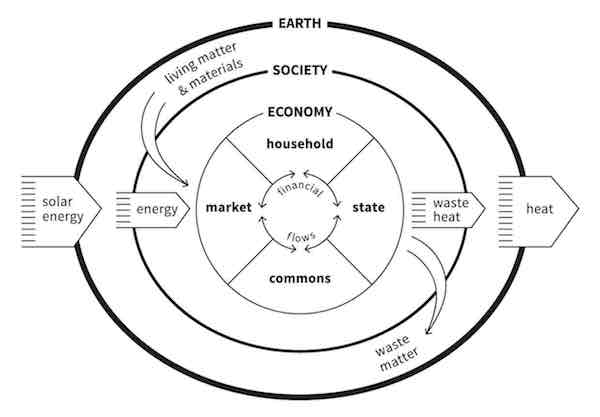
Anyone living within that ring, in the hole in the middle of the doughnut, is in a state of deprivation. The outer ring of the doughnut consists of the Earth’s environmental limits, beyond which we inflict dangerous levels of climate change, ozone depletion, water pollution, loss of species and other assaults on the living world. The area between the two rings – the doughnut itself – is the “ecologically safe and socially just space” in which humanity should strive to live. The purpose of economics should be to help us enter that space and stay there. As well as describing a better world, this model allows us to see, in immediate and comprehensible terms, the state in which we now find ourselves. At the moment we transgress both lines. Billions of people still live in the hole in the middle. We have breached the outer boundary in several places.
An economics that helps us to live within the doughnut would seek to reduce inequalities in wealth and income. Wealth arising from the gifts of nature would be widely shared. Money, markets, taxation and public investment would be designed to conserve and regenerate resources rather than squander them. State-owned banks would invest in projects that transform our relationship with the living world, such as zero-carbon public transport and community energy schemes. New metrics would measure genuine prosperity, rather than the speed with which we degrade our long-term prospects.
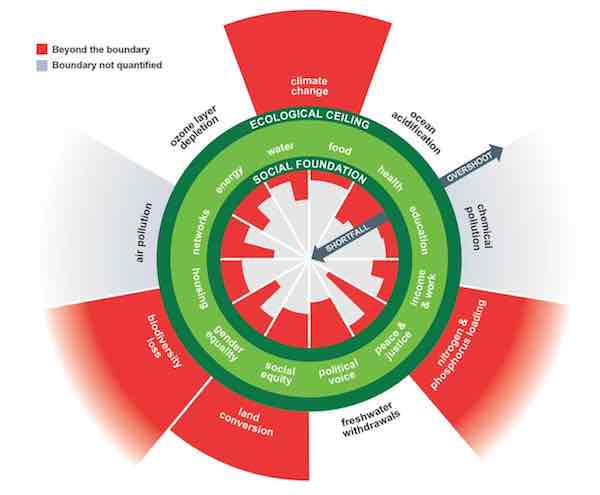
Such proposals are familiar; but without a new framework of thought, piecemeal solutions are unlikely to succeed. By rethinking economics from first principles, Raworth allows us to integrate our specific propositions into a coherent programme, and then to measure the extent to which it is realised. I see her as the John Maynard Keynes of the 21st century: by reframing the economy, she allows us to change our view of who we are, where we stand, and what we want to be. Now we need to turn her ideas into policy. Read her book, then demand that those who wield power start working towards its objectives: human prosperity within a thriving living world.

Hungry for knowledge, or hungry for a paycheck? Our education systems are a giant failure.
• The Commodification of Education (Steve Keen)

A real life consequence of Commodification of Education. Intellectual Yet Idiot.
• The Fed Could Use Less Book Learning and More Street Smarts (Ricketts)
I’ll bet pundits and pollsters will forever ponder how Donald Trump got elected. For me, it’s straightforward: The American people—or at least enough of them to propel Mr. Trump into office—wanted to infuse practical business experience into the government. To borrow a phrase from my friend, the economist Larry Lindsey, voters rejected the political ruling class in favor of real-world experience. Which brings me to the Federal Reserve. In 2012 Jim Grant, the longtime financial journalist, delivered a speech at the Federal Reserve Bank of New York. “In the not quite 100 years since the founding of your institution,” he said, “America has exchanged central banking for a kind of central planning and the gold standard for what I will call the Ph.D. standard.” Central banking, in other words, is now dominated by academics. And while I don’t blame them for it, academics by their nature come to decision-making with a distinctly—you guessed it—academic perspective.
The shift described by Mr. Grant has had consequences. For one thing, simplicity based on age-old practice has been replaced by complexity based on econometric theory. Big Data has played an increasingly prominent role in how the Fed operates, even as the Fed’s role in the economy has deepened and widened. Rather than enlisting business leaders and bankers to fulfill the Fed’s increasingly complex mission, the nation’s political and monetary authorities turned primarily to the world’s most brilliant economists, who can be thought of more and more as monetary scientists. “Central bankers have invited politicians to abdicate leadership authority to an inbred society of PhD academics who are infected to their core with groupthink, or as I prefer to think of it: ‘groupstink,’” argues former Dallas Fed analyst Danielle DiMartino Booth in a new book.
Ten of the 17 current Fed governors and regional bank presidents have doctorates in economics. Few have much experience in the private economy. Most have spent the bulk of their careers at the classroom lectern or in Washington. This is a sea change. In past decades, Fed members and governors frequently had experience in banking, industry and agriculture. Do the results indicate that our pursuit of intellectual horsepower has produced a stronger economy? Today’s labor-force participation rate is lower than at any time since the late 1970s; an oven from Sears that cost $160 in 1975 would cost more than $400 today; and despite unprecedented intervention in the economy, America has experienced its worst recovery since the Great Depression.Given the cumulative genius of the leaders of the Federal Reserve System, and the highly sophisticated quantitative tools and policies the Fed has developed under their direction, why aren’t we doing better?

Just one example of how deluded the UK, like the US, has fast become when it comes to Russia. ‘Putin Did It’ is very much alive. It’s getting mighty tiresome.
• Spectre Of Russian Influence Looms Large Over French Election (G.)
The golden domes of one of Vladimir Putin’s foreign projects, the recently built Russian Holy Trinity cathedral in the heart of Paris, rise up not far from the Elysée palace, the seat of the French presidency. Dubbed “Putin’s cathedral” or “Saint-Vladimir”, it stands out as a symbol of the many connections the French elite has long nurtured with Russia, and which the Kremlin is actively seeking to capitalise on in the run-up to the French presidential election. France is an important target for Russia’s soft power and networks of influence. The country is a key pillar of the European Union, an important Nato member and home to Europe’s largest far-right party, the Front National, whose leader, Marine Le Pen, is expected to reach the 7 May run-off in the presidential vote and has benefited from Russian financing.
Le Pen took the extraordinary step of travelling to Moscow to meet Putin in March, just a month before the French vote, to boost her international profile and showcase her closeness to the Russian president’s worldview – including his virulent hostility towards the EU and his vision of a “civilisational” clash with radical Islam. Yet she is far from being the only presidential candidate to favour warmer relations with Russia, nor to reflect a certain French fascination with the Kremlin strongman. [..] Russian meddling in elections has become a hot political topic in the US, and there has been much speculation about Russia’s attempts to favour Brexit as well as anti-EU parties in the Netherlands and Germany. But France is now widely seen as the key country where Russia has a strategic interest in encouraging illiberal forces and seeking to drive wedges between western democracies.

One shudders to imagine what happens if Erdogan loses the Sunday April 16 referendum. And also what happens if he wins.
• Moment Of Reckoning In Turkey As Alleged Coup Plotters Go On Trial (G.)
Turkish prosecutors are laying the groundwork for large-scale trials of hundreds of people accused of participating in a coup attempt last July, an undertaking that is already transforming society and will be a reckoning of sorts for a nation that has endured much upheaval in recent years. Authorities say the trials will shed light on alleged links between the accused and Fethullah Gülen, an exiled US-based preacher with a vast grassroots network. The onset of the trials has refocused attention on the large-scale purges of Turkey’s government, media and academia after the coup attempt, in which tens of thousands of people – many with no known links to the Gülenists – were dismissed or jailed. Meanwhile, Turkey is preparing for a referendum on Sunday on greater presidential powers, which could prove the most significant political development in the history of the republic.
“What happened on 15 July [the day of the attempted coup] and what is now happening for months is completely transformative for Turkey,” said a journalist who worked for a Gülen-affiliated media outlet and requested anonymity for fear of reprisals. “One big part of society has been subjected to extreme demonisation in a process that cost them their jobs, reputation, freedom or ultimately their lives. Another part of the society has been filled with anger and radically politicised. “Nothing can be the same as before 15 July any longer – ever,” he added. Turkish courts have already begun several parallel trials over the coup attempt. Last month prosecutors demanded life sentences for 47 people accused of attempting to assassinate the president, Recep Tayyip Erdogan, on the night of the putsch, and the largest trial yet opened on 28 February in a specially built courtroom outside Ankara filled with more than 300 suspects accused of murder and attempting to overthrow the government.
About 270 suspects, including Gülen, went on trial in absentia in Izmir in January, and an indictment issued in late February alleges that Gülenists infiltrated the state and charges 31 members of the military with attempting to overthrow the constitutional order. The state intelligence agency, the National Intelligence Service (MIT), has sent prosecutors in Ankara a list of 122,000 individuals who allegedly used a secure messaging app, ByLock, which security officials say was widely used by the Gülen network for communications.

Handing out money and housing to refugees while Greeks themselves are hungry and homeless. Great plan.
• Greece: Cash and Apartments for Refugees with UNHCR Aid (GR)
Migration Deputy Minister Yiannis Mouzalas announced on Monday that refugees will be getting cash instead of free meals and will be staying in rented apartments in order to decongest migrant camps. In a joint press conference with the participation of Representative of the United Nations High Commissioner for Refugees (UNHCR) in Greece Philippe Leclerc, President of Union of Municipalities of Thesssaly Giorgos Kotsos and Larissa Mayor Apostolos Kaloyiannis, Mouzalas explained the project of decongestion of migrant camps and relocation of refugees in urban centers and smaller municipalities. Mouzalas said that refugees will be getting cash in hand for their meals instead of rations and will be staying in apartments under the UNHCR program, so that they will be getting primary care. The program applies for 10,000 asylum seekers in 2017 and another 10,000 in 2018.
The deputy minister clarified that the apartments will be rented by owners under free market conditions and the municipalities will assist the implementation of the program. This way, he said, local communities will benefit financially. The program will apply provided that the EU-Turkey agreement for refugee returns will continue to apply. This way, Mouzalas continued, the 40 camps across Greece that host 40,000 asylum seekers will be reduced to 17-20 with a maximum of 500 people each for 2017. In 2018, another 10,000 asylum seekers will be relocated under the program. The project will start with 500 refugees leaving the Koutsohera camp and moving to Larissa, a municipality that expressed interest in the program. As the program progresses, the camps in Thessaly (Koutsohera, Volos and Trikala) will eventually close and refugees will relocate in municipalities.
“The UN will help in the expansion of the hospitality program for refugees in apartments to improve their living conditions,” Leclerc said. The program has already been implemented in Athens, Thessaloniki and Livadia. The president of the Union of Municipalities of Thesssaly underlined that the program gives municipalities the opportunity to inject money to local communities through the leasing of the apartments and the cash the refugees would spend on food. The Larissa Mayor said that “The municipality of Larissa will work in this direction. Previously there was pressure to accommodate migrants in apartments, but it was too early. Today we are not afraid to do it.”

The green movement condemns itself by offering only half solutions. Saving the planet would require drastic changes to everyone’s lifestyle and comfort. Instead we get CON21.
• Why The Human Race Is Heading For The Fire (G.)
The future for humanity and many other life forms is grim. The crisis gathers force. Melting ice caps, rising seas, vanishing topsoil, felled rainforests, dwindling animal and plant species, a human population forever growing and gobbling and using everything up. What’s to be done? Paul Kingsnorth thinks nothing very much. We have to suck it up. He writes in a typical sentence: “This is bigger than anything there has ever been for as long as humans have existed, and we have done it, and now we are going to have to live through it, if we can.” Hope finds very little room in this enjoyable, sometimes annoying and mystical collection of essays. Kingsnorth despises the word’s false promise; it comforts us with a lie, when the truth is that we have created an “all-consuming global industrial system” which is “effectively unstoppable; it will run on until it runs out”.
To imagine otherwise – to believe that our actions can make the future less dire, even ever so slightly – means that we probably belong to the group of “highly politicised people, whose values and self-image are predicated on being activists”. According to Kingsnorth, such people find it hard to be honest with themselves. He was once one of them. “We might tell ourselves that The People are ignorant of The Facts and that if we enlighten them they will Act. We might believe that the right treaty has yet to be signed, or the right technology yet to be found, or that the problem is not too much growth and science and progress but too little of it. Or we might choose to believe that a Movement is needed to expose the lies being told to The People by the Bad Men in Power who are preventing The People from doing the rising up they will all want to do when they learn The Truth.”
He says this is where “the greens are today”. Environmentalism has become “a consolation prize for a gaggle of washed-up Trots”. As a characterisation of the green movement, this outbreak of adolescent satire seems unfair. To suggest that its followers become activists only because their “values and self-image” depend on it implies that there is no terror in their hearts, no love of the natural world, nothing real other than their need for a hobby.









Home › Forums › Debt Rattle April 12 2017